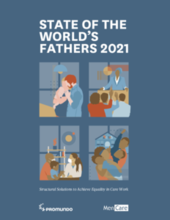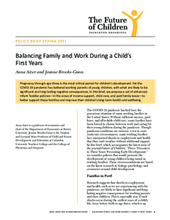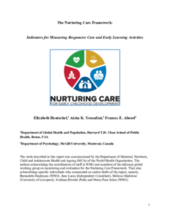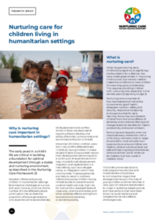Displaying 31 - 40 of 496
The State of the World’s Fathers 2021 report – the fourth in the series – presents research on care work during the COVID-19 pandemic, focusing on structural barriers that prevent equitable distribution of caregiving between women and men.
This course is a resource for parents or those who work with parents of young children to support them to provide brain-building experiences and nurturing care.
The New Neighborhood is a limited series podcast that explores some of the dramatic changes taking place across the U.S. as people work to reinforce a sense of community, support young children and families, and work to build equity within communities.
In this brief, the authors propose a set of enhanced Infant-Toddler policies—in the areas of income support, child care, and paid family leave—to better support families and improve their children’s long-term health and wellbeing.
Two new indicators for the Monitoring and Evaluation Framework of the Nurturing Care Framework (NCF) have been developed in support of programme implementation. These indicators need to be validated before they can be recommended widely. Read the report to learn more about the proposed indicators.
First Years First Priority is a Europe-wide campaign set up to advocate for prioritization of early childhood development in public policies, with a particular focus on families and children who are at greater risk of discrimination and exclusion. This briefing provides a description of the policy context in which the 'First Year, First Priority' campaign is launched.
This workshop draws upon content from the Nurturing Care Framework, the Science of Early Child Development and the Beginning of Life film, to walk participants through why investing in early childhood is so important, including scientific and economic evidence.
This handbook is part of a set of resources for implementing the Nurturing Care Framework.
This brief summarizes actions that programme planners and implementers should take to minimize the impact that emergencies have on the lives of young children and their families.
This webinar highlighted how children with developmental delays and disabilities can have the best chance to not only survive, but also thrive. The webinar delved into the challenges, emerging research from Kenya, and practical country examples from Mozambique, Tajikistan and Peru.





